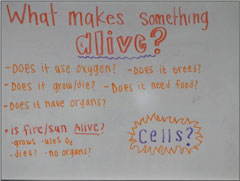Pedagogy
Over thirty years of research in science education and cognitive science have contributed to our current understanding of best practices in teaching and learning science and in elementary teacher preparation in science. LSET employs these design principles. The central principle of LSET is that students construct a meaningful understanding of central ideas in biology through inquiry-based experiences and social interaction.
The LSET course is organized around a central theme: how energy and matter flow through living systems. The course is divided into chapters, each of which develops students’ understanding of one or two major topics related to this theme. Every chapter in LSET opens with a formative assessment designed to elicit students’ prior knowledge. STEM education research has clearly demonstrated that students’ prior knowledge strongly influences their learning and that these initial ideas may be resistant and at odds with scientists’ ideas; making students explicitly aware of their ideas allows them to build on and revise those ideas more effectively.
The primary pedagogical approach taken in each chapter, and thus of the course as a whole, is inquiry-based activities which allow students to construct the targeted scientific concepts themselves using evidence from their own observations, experiments, and investigations. All of these investigations take place in small, collaborative learning groups which have been shown to improve student achievement on STEM content exams, improve students’ attitude towards learning STEM material, and increase students’ self-esteem. This then feeds into whole-class discussions where students share, critique and refine their understandings, and where the instructor facilitates interactions to highlight key ideas, points of dissent and important scientific concepts and motivates future investigations. This approach reflects the processes used by scientists and allows students to better understand the nature of science. Many studies have shown that students are better able to transfer their knowledge to new situations when they are active participants in their instruction and engage in metacognitive practices to recognize what they understand, how they learned what they know, and when they need more information. For knowledge to be incorporated as a stable part of a student’s conceptual framework, students need multiple exposures to concepts over an extended period of time and to connect those concepts with their everyday understanding. Therefore, LSET consists of a “spiral curriculum” where topics are revisited at increasing levels of complexity allowing for repeated exposures in order to integrate and reconcile new knowledge with prior knowledge.
At the end of a chapter, students must demonstrate their ability to apply their knowledge to novel contexts. Research suggests that conceptual change is not complete until students can successfully transfer their knowledge to a different problem in a different setting. Also at the end of each chapter, students revisit these initial ideas and reflect on how their thinking has changed and the experiences that contributed to this change. This practice allows students to examine and better understand their own learning process.



